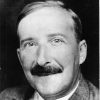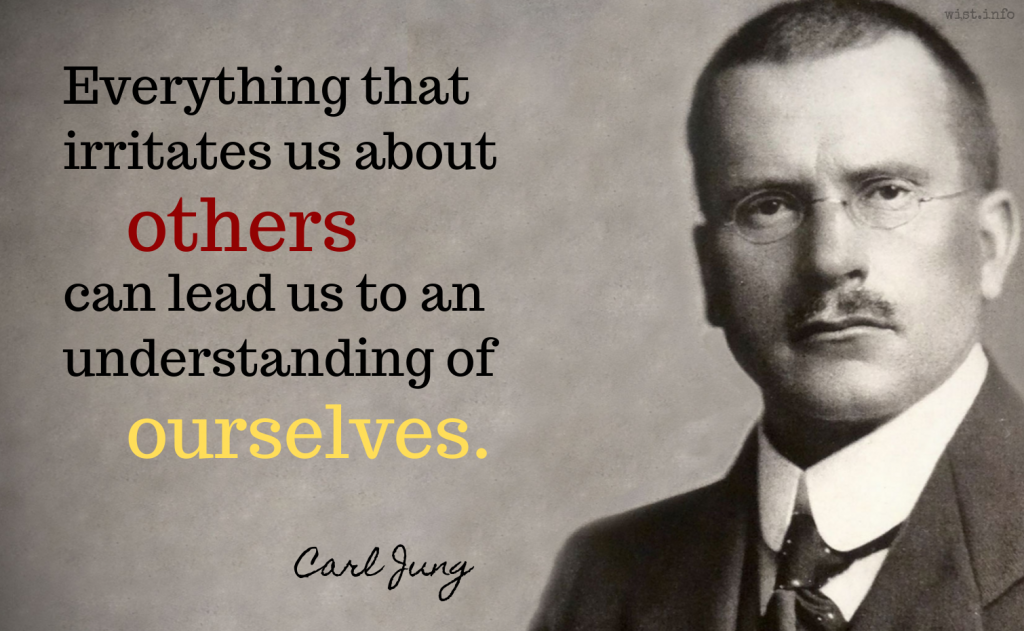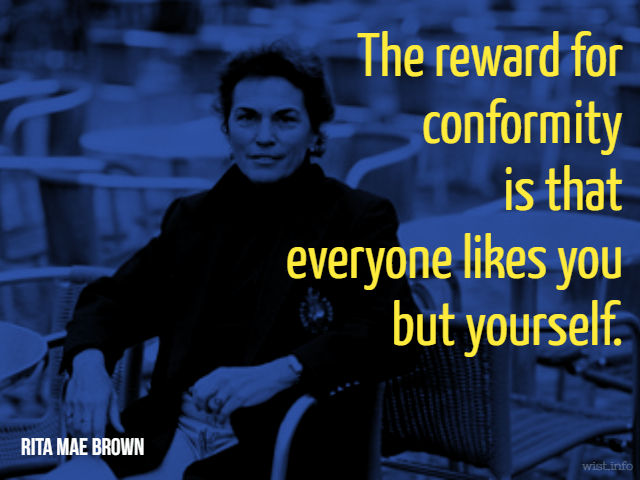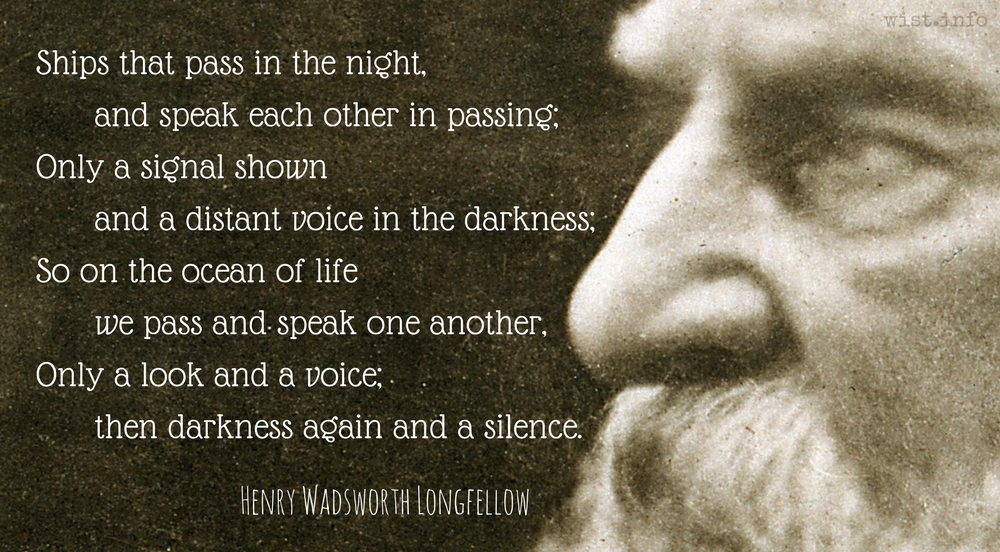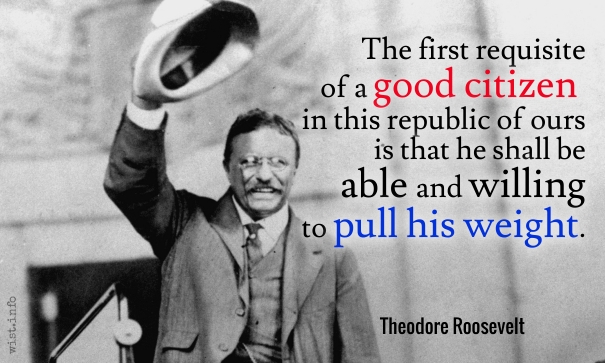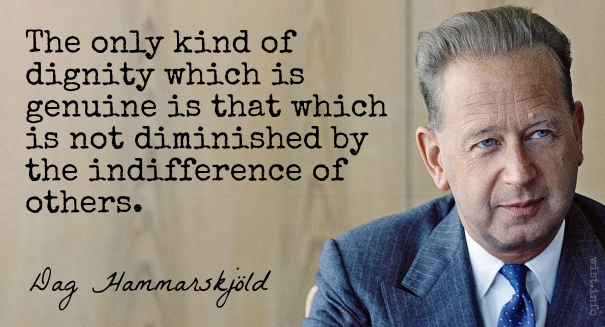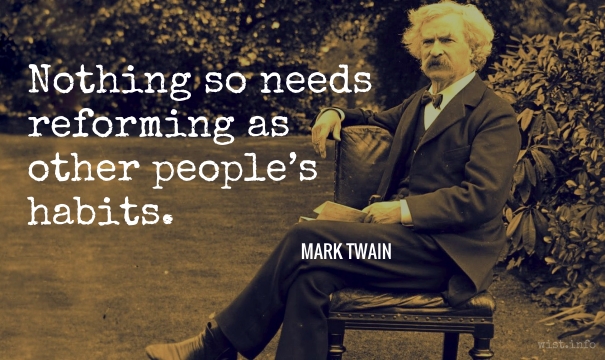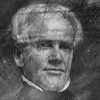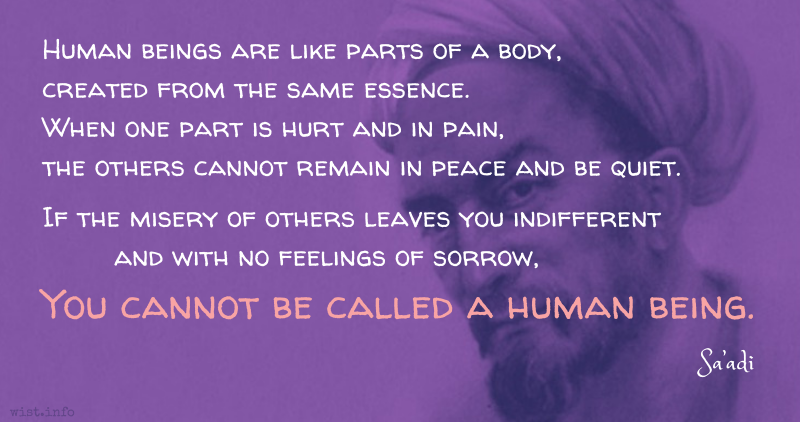Shall I tell you the secret of the true scholar? It is this: Every man I meet is my master in some point, and in that I learn of him.
Ralph Waldo Emerson (1803-1882) American essayist, lecturer, poet
“Greatness,” Letters and Social Aims (1876)
(Source)
This appears to be the origin of the much more common paraphrase (not found in Emerson's works, but popularized by Dale Carnegie in How to Win Friends and Influence People (1936)): "In my walks, every man I meet is my superior in some way, and in that, I learn from him."
Quotations about:
others
Note not all quotations have been tagged, so Search may find additional quotes on this topic.
The condition of our survival in any but the meagerest existence is our willingness to accommodate ourselves to the conflicting interests of others, to learn to live in a social world.
Learned Hand (1872-1961) American jurist
“To Yale Law Graduates,” speech, Yale Law School (1931-06-07)
(Source)
Collected in The Spirit of Liberty (1953).
Other people’s truth may comfort us, but only your own persuades us.
Mignon McLaughlin (1913-1983) American journalist and author
The Second Neurotic’s Notebook, ch. 4 (1966)
(Source)
We want perfection in other people, and yet we do not put right our own failings. We want to see others firmly corrected, but we refuse correction ourselves. We take offence when permission is given to others, but we do not want our own requests refused. We want rules to check the activities of others, but we are indignant at restrictions on ourselves.
[Libenter videmus alios perfectos, sed tamen proprios non emendamus defectus. Volumus quod alii districte corrigantur, et nos ipsi corrigi nolumus, aut negari quod petimus. Alios restringi per statuta volumus, et ipsi nullatenus patimur amplius cohiberi.]
Thomas à Kempis (c. 1380-1471) German-Dutch priest, author
The Imitation of Christ [De Imitatione Christi], Book 1, ch. 16, v. 2ff (1.16.2-3) (c. 1418-27) [tr. Knott (1962)]
(Source)
(Source (Latin)). Alternate translations:
We would gladly have others perfect, but will not amend our own defaults. We would that others should be straitly corrected for their offences, but we will not be corrected. It misliketh us that others have liberty, but we will not be denied of that we ask. We would also that others should be restrained according to the statutes, but we in nowise will be restrained.
[tr. Whitford/Raynal (1530/1871)]
We would gladly have others perfect, yet we will not amend our own faults. We desire others to be strictly corrected for their offenses, yet we will not be corrected. We dislike it that others have liberty, yet we will not be denied what we ask. We desire that others should be restrained according to the laws, yet we will in no way be restrained.
[tr. Whitford/Gardiner (1530/1955)]
It is injustice to expect that in another which thou hast not in thy self, to looke for perfection in others, and yet not to amend imperfections in our selves. We will have others severely punisht, and will not amend our selves; the large liberty of others disliketh us, and yet we will not have our desires deni'd us, we will have rigorous Lawes imposed upon others, but in no sort will we our selves be restrained.
[tr. Page (1639), 1.16.8-9]
And, indeed, nothing is more common, than to express exceeding Zeal in amending our Neighbours, and mighty Indignation against Their Vices or Imperfections, while at the same time we neglect the beginning at Home, and either quite overlook, or seem highly contented with our own. We set up for Reformers, declaim at the Wickendess of the Age, and are all for suppressing and punishing it by vigorous Laws; and yet are unwilling that any Check or Restraint should be put upon our own Freedoms.
[tr. Stanhope (1696; 1706 ed.)]
But we require perfection in the rest of mankind, and take no care to rectify the disorders of our own heart; we desire that the faults of others should be severely punished, and refuse the gentlest correction ourselves; we are offended at their licentiousness, and yet cannot bear the least opposition to our own immoderate desires. We would subject all to the control of rigorous statute and penal laws, but will not suffer any restraint upon our own actions.
[tr. Payne (1803), 1.16.3]
We would willingly have others perfect, and yet we amend not our own faults. We will have others severely corrected, and will not be corrected ourselves. The large liberty of others displeaseth us; and yet we will not have our own desires denied us. We will have others kept under by strict laws; but in no sort will ourselves be restrained.
[ed. Parker (1841)]
We willingly require perfection in the rest of mankind, and yet do not rectify the disorders of our own hearts. We desire that the faults of others should be severely punished, and refuse the gentlest correction ourselves. We are offended at their licentiousness, and yet cannot bear the least denial of our own immoderate desires. We would subject all to the control of rigorous statutes, but suffer no restraint upon our own action.
[tr. Dibdin (1851)]
We would fain have others perfect, and yet we amend not our own defects. We would have others strictly corrected, but will not be corrected ourselves. The large liberty of others displeases us, and yet we would not be denied anything we ask for. We wish others to be bound down by laws, and we suffer ourselves to be in no sort restrained.
[ed. Bagster (1860)]
We are ready to see others made perfect, and yet we do not amend our own shortcomings. We will that others be straitly corrected, but we will not be corrected ourselves. The freedom of others displeaseth us, but we are dissatisfied that our own wishes shall be denied us. We desire rules to be made restraining others, but by no means will we suffer ourselves to be restrained.
[tr. Benham (1874)]
We are desirous to have others perfect, and yet we amend not our own faults. We will have others severely corrected, and will not be corrected ourselves. The large liberty of others displeaseth us; and yet we will not have our own desires denied us. We will have others kept under by strict laws; but in no sort will we ourselves be restrained.
[tr. Anon. (1901)]
We want them to be perfect, yet we do not correct our own faults. We wish them to be severely corrected, yet we will not correct ourselves. Their great liberty displeases us, yet we would not be denied what we ask. We would have them bound by laws, yet we will allow ourselves to be restrained in nothing.
[tr. Croft/Bolton (1940)]
We would readily have others perfect and yet not amend our own defects. We want others rigidly corrected and are unwilling to be corrected ourselves. The wide freedom of others displeases us, and yet we would not be denied whatever we ask. We wish others to be bound by rules, and will ourselves in no way be held in.
[tr. Daplyn (1952)]
For we require other people to be perfect, but do not correct our own faults. We wish to see others severely reprimanded; yet we are unwilling to be corrected ourselves. We wish to restrict the liberty of others, but are not willing to be denied anything ourselves. We wish others to be bound by rules, yet we will not let ourselves be bound.
[tr. Sherley-Price (1952)]
We like to have everybody around us quite perfect, but our own faults -- we never seem to correct them. Tom, Dick and Harry must be strictly called to order, but we aren't fond of being called to order ourselves. It is always the other man that has too much rope given him -- our wishes must not be thwarted; rules for everybody else, but our own liberties must not be abridged for a moment.
[tr. Knox-Oakley (1959), 1.16.3]
Though quick to expect perfection in others, we take little care to correct our own shortcomings. We wouidl have others strictly corrected, but not ourselves. The wide freedom of others displeases us, yet we wish to be denied nothing that we ourselves desire. We would have others under the restraint of the rule while unwilling ourselves to be under any sort of restraint.
[tr. Rooney (1979)]
We would willingly have others be perfect, and yet we fail to correct our own faults. We want others to be strictly corrected, and yet we are unwilling to be corrected ourselves. Other peoples' far-ranging freedom annoys us, and yet we insist on having our own way. We wish others to be tied down by rules, and yet we will not allow ourselves to be held in check in any way at all.
[tr. Creasy (1989)]
We never get anywhere in this world without the forces of history and individual persons in the background helping us to get there.
Martin Luther King, Jr. (1929-1968) American clergyman, civil rights leader, social activist, preacher
“Conquering Self-Centeredness,” sermon, Dexter Ave. Baptist Church, Montgomery, Ala. (11 Aug 1957)
(Source)
I am not concerned that other people do not understand me. I worry that I do not understand other people.
[不患人之不己知、患不知人也]
Confucius (c. 551- c. 479 BC) Chinese philosopher, sage, politician [孔夫子 (Kǒng Fūzǐ, K'ung Fu-tzu, K'ung Fu Tse), 孔子 (Kǒngzǐ, Chungni), 孔丘 (Kǒng Qiū, K'ung Ch'iu)]
The Analects [論語, 论语, Lúnyǔ], Book 1, verse 16 (1.16) (6th C. BC – AD 3rd C.) [tr. Li (2020)]
(Source)
(Source (Chinese)). See also 4.14, 14.30, 15.19. Alternate translations:
I will not be afflicted at men's not knowing me; I will be afflicted that I do not know men.
[tr. Legge (1861)]
It does not greatly concern me that men do not know me; my great concern is, my not knowing them.
[tr. Jennings (1895)]
One should not be concerned not to be understood of men; one should be concerned not to understand men.
[tr. Ku Hung-Ming (1898)]
I will not grieve that men do not know me; I will grieve that I do not know men.
[tr. Soothill (1910)]
Not worried that men do not know me, but that I do not understand men.
[tr. Pound (1933)]
[The good man] does not grieve that other people do not recognize his merits. His only anxiety is lest he should fail to recognize theirs.
[tr. Waley (1938)]
I am not concerned that people do not know of me; I am concerned that I do not know of them.
[tr. Ware (1950)]
It is not the failure of others to appreciate your abilities that should trouble you, but rather your failure to appreciate theirs.
[tr. Lau (1979)]
One does not worry about the fact that other people do not appreciate one. One worries about not appreciating other people.
[tr. Dawson (1993)]
Don't worry if people don't recognize your merits; worry that you may not recognize theirs.
[tr. Leys (1997)]
Do not worry about men not knowing you; rather, worry about incapability and ignorance.
[tr. Huang (1997)]
Do not worry about that others do not understand me, just worry about that I do not understand others.
[tr. Cai/Yu (1998)]
Don't worry about not being acknowledged by others; worry about failing to acknowledge them.
[tr. Ames/Rosemont (1998)]
He does not worry that others do not know him; he worries that he does not know others.
[tr. Brooks/Brooks (1998)]
Don't grieve when people fail to recognize your ability. Grieve when you fail to recognize theirs.
[tr. Hinton (1998)]
Do not be concerned about whether or not others know you; be concerned about whether or not you know others.
[tr. Slingerland (2003)]
Don’t worry about whether other people understand you. Worry about whether you understand other people.
[tr. Watson (2007)]
Do not worry that other people do not know you. But be concerned that you do not know them.
[tr. Annping Chin (2014)]
I have begun in old age to understand just how oddly we are all put together. We are so proud of our autonomy that we seldom if ever realize how generous we are to ourselves, and just how stingy with others. One of the booby traps of freedom — which is bordered on all sides by isolation — is that we think so well of ourselves. I now see that I have helped myself to the best cuts at life’s banquet.
You ought to regulate your manner of behaviour towards others, not according to your own humour, but agreeably to the pleasure and inclination of those with whom you converse.
[Il che acciò che tu più agevolmente apprenda di fare, dèi sapere che a te convien temperare et ordinare i tuoi modi non secondo il tuo arbitrio, ma secondo il piacer di coloro co’ quali tu usi, et a quello indirizzargli.]
Giovanni della Casa (1503-1556) Florentine poet, author, diplomat, bishop
Galateo: Or, A Treatise on Politeness and Delicacy of Manners [Il Galateo overo de’ costumi], ch. 2 (1558) [tr. Graves (1774)]
(Source)
(Source (Italian)). Alternate translations:
It behooves thee, to frame and order thy maners and doings, not according to thine owne minde and fashion: but to please those, with whome thou livest, and after that sort direct thy doings.
[tr. Peterson (1576)]
You must know that it will be to your advantage to temper and adapt your manners not according to your own choices but according to the pleasure of those with whom you are dealing and act accordingly.
[tr. Einsenbichler/Bartlett (1986)]
The eyes of others our prisons; their thoughts our cages.
Virginia Woolf (1882-1941) English modernist writer [b. Adeline Virginia Stephen]
“An Unwritten Novel” (1920)
(Source)
While then the worst man is he who displays vice both in his own affairs and in his dealings with his friends, the best man is not he who displays virtue in his own affairs merely, but he who displays virtue towards others; for this is the hard thing to do.
[κάκιστος μὲν οὖν ὁ καὶ πρὸς αὑτὸν καὶ πρὸς τοὺς φίλους χρώμενος τῇ μοχθηρίᾳ, ἄριστος δ᾽ οὐχ ὁ πρὸς αὑτὸν τῇ ἀρετῇ ἀλλὰ πρὸς ἕτερον: τοῦτο γὰρ ἔργον χαλεπόν.]
Aristotle (384-322 BC) Greek philosopher
Nicomachean Ethics [Ἠθικὰ Νικομάχεια], Book 5, ch. 1 (5.1.18) / 1130a.5-8 (c. 325 BC) [tr. Peters (1893)]
(Source)
(Source (Greek)). Alternate translations:
Now he is the basest of men who practises vice not only in his own person, but towards his friends also; but he the best who practises virtue not merely in his own person but towards his neighbour, for this is a matter of some difficulty.
tr. Chase (1847), ch. 2]
Worst of men is he whose wickedness affects not himself alone but his fellow with him; best of men is he whose virtue affects not himself alone but his fellow with him; for such a one has in all sooth a hard task.
[tr. Williams (1869)]
As then the worst of men is he who exhibits his depravity both in his own life and in relation to his friends, the best of men is he who exhibits his virtue not in his own life only but in relation to others; for this is a difficult task.
[tr. Welldon (1892)]
Now the worst man is he who exercises his wickedness both towards himself and towards his friends, and the best man is not he who exercises his virtue towards himself but he who exercises it towards another; for this is a difficult task.
[tr. Ross (1908)]
As then the worst man is he who practises vice towards his friends as well as in regard to himself, so the best is not he who practises virtue in regard to himself but he who practises it towards others; for that is a difficult task.
[tr. Rackham (1934)]
The worst sort of person, then, is the one who uses his depravity both in relation to himself and in relation to his friends, whereas the best sort is not the one who uses his virtue in relationship to himself but the one who uses it in relation to another person, since that is difficult work.
[tr. Reeve (1948)]
The worst man, then, is the one whose evil habit affects both himself and his friends, while the best man is one whose virtue is directed not to himself, but to others, for this is a difficult task.
[tr. Apostle (1975)]
So the worst person is the one who exercises his wickedness towards both himself and his friends, and the best is not the one who exercises his virtue towards himself but the one who exercises it towards another; because this is a difficult task.
[tr. Thomson/Tredennick (1976)]
So the worst person is the one who exercises wickedness in relation to himself and in relation to his friends, and the best is not he who exercises his virtue in relation to himself but the one who exercises it in relation to others, since this is a difficult thing to do.
[tr. Crisp (2000)]
Worst, then, is he who treats both himself and his friends in a corrupt way, but best is he who makes use of virtue not in relation to himself but in relation to another. For this is a difficult task.
[tr. Bartlett/Collins (2011)]
Nobody really listens to anyone else, and if you try it for a while you’ll see why.
Mignon McLaughlin (1913-1983) American journalist and author
The Second Neurotic’s Notebook, ch. 3 (1966)
(Source)
Truth is like the flu. I fight it off, but it changes in other bodies and returns in a form to which I am not immune.
James Richardson (b. 1950) American poet
“Vectors: 56 Aphorisms and Ten-second Essays,” Michigan Quarterly Review, #49 (Spring 1999)
(Source)
All things are tolerable which others have borne and are bearing.
[Sed significat tolerabilia esse, quae et tulerint et ferant ceteri.]
Marcus Tullius Cicero (106-43 BC) Roman orator, statesman, philosopher
Tusculan Disputations [Tusculanae Disputationes], Book 3, ch. 23 (3.23) / sec. 57 (45 BC) [tr. Yonge (1853)]
(Source)
(Source (Latin)). Alternate translations:
- "Those things are in themselves tolerable, which others have born, and do bear." [tr. Wase (1643)]
- "All things are tolerable which others have borne and can bear." [tr. Main (1824)]
- "What others have endured and endure must be tolerable." [tr. Otis (1839)]
- "Things are tolerable which others have borne and are bearing." [tr. Peabody (1886)]
- "The circumstances at hand are indeed tolerable, since others have tolerated them and continue to do so." [tr. Graver (2002)]
The worst days of darkness through which I have ever passed have been greatly alleviated by throwing myself with all my energy into some work relating to others.
James A. Garfield (1831-1881) US President (1881), lawyer, lay preacher, educator
Letter to B. A. Hinsdale (30 Apr 1874)
(Source)
Gossip isn’t scandal and it’s not merely malicious. It’s chatter about the human race by lovers of the same. Gossip is the tool of the poet, the shop-talk of the scientist, and the consolation of the housewife, wit, tycoon and intellectual. It begins in the nursery and ends when speech is past.
Phyllis McGinley (1905-1978) American author, poet
“A New Year and No Resolutions,” Woman’s Home Companion (Jan 1957)
(Source)
Everything that irritates us about others can lead us to an understanding of ourselves.
Carl Jung (1875-1961) Swiss psychologist
Memories, Dreams, Reflections [Erinnerungen, Träume, Gedanken], ch. 9 “Travels,” sec. 2 (1961; 1973 ed.) [with Aniela Jaffé] [tr. Winton/Winton (1963)]
(Source)
The reward for conformity was that everyone liked you but yourself.
Rita Mae Brown (b. 1944) American author, playwright
Venus Envy, ch. 15 (1993)
(Source)
Often paraphrased in the present tense: "The reward for conformity is that everyone likes you but yourself."
A golden rule: We must judge men, not by their opinions, but by what those opinions make of them.
Georg C. Lichtenberg (1742-1799) German physicist, writer
Aphorisms, Notebook J, #201, p. 966 (1789-93) [tr. Hollingdale (1990)]
(Source)
Alternate translations:
- "A golden rule: we must judge people, not by their opinions, but by what these opinions make of them." [tr. Tester (2012)]
- It is a golden rule that one should not judge people according to their opinions, but according to what these opinions make of them.
- "It is a golden rule not to judge men by their opinions but rather by what their opinions make of them."
- "One must judge men not by their opinions, but by what their opinions have made of them."
- "Don't judge a man by his opinions, but what his opinions have made of him."
Ships that pass in the night, and speak each other in passing;
Only a signal shown and a distant voice in the darkness;
So on the ocean of life we pass and speak one another,
Only a look and a voice; then darkness again and a silence.
Henry Wadsworth Longfellow (1807-1882) American poet
Tales of a Wayside Inn, Part 3 “The Theologian’s Tale: Elizabeth” part 4 (1874)
(Source)
Be charitable and indulgent to every one but yourself.
Joseph Joubert (1754-1824) French moralist, philosopher, essayist, poet
(Attributed)
(Source)
Frequently attributed to Joubert, but with no citation from his works. Earliest quoted in Maturin M. Ballou, ed., Treasury of Thought (1884 ed.).
Sometimes given "but thyself."
We have a marvelous gift, and you see it develop in children, this ability to become aware that other people have minds just like your own and feelings that are just as important as your own, and this gift of empathy seems to me to be the building block of our moral system.
The first requisite of a good citizen in this republic of ours is that he shall be able and willing to pull his weight; that he shall not be a mere passenger, but shall do his share in the work that each generation of us finds ready to hand; and, furthermore, that in doing his work he shall show, not only the capacity for sturdy self-help, but also self-respecting regard for the rights of others.
It is only when you truly don’t care what people think that you truly don’t need to care what people think.
Abdal Hakim Murad (b. 1960) British Muslim shaykh, researcher, writer, academic [b. Timothy John Winter]
“Contentions 2,” # 5
(Source)
But the truth is, that no man is much regarded by the rest of the world, except where the interest of others is involved in his fortune. The common employments or pleasures of life, love or opposition, loss or gain, keep almost every mind in perpetual agitation. If any man would consider how little he dwells upon the condition of others, he would learn how little the attention of others is attracted by himself.
Samuel Johnson (1709-1784) English writer, lexicographer, critic
The Rambler, #159 (24 Sep 1751)
(Source)
The bonds that unite another person to ourself exist only in our mind. Memory as it grows fainter relaxes them, and notwithstanding the illusion by which we would fain be cheated and with which, out of love, friendship, politeness, deference, duty, we cheat other people and we exist alone. Man is the only creature that cannot emerge from himself, that knows his fellows only in himself; when he asserts the contrary he is lying.
The best thing to give to your enemy is forgiveness; to an opponent, tolerance; to a friend, your heart; to your child, a good example; to a father, deference; to your mother, conduct that will make her proud of you; to yourself, respect; to all men, charity.
Clara Lucas Balfour (1808-1878) English novelist, lecturer, temperance campaigner
Sunbeams for All Seasons: Counsels, Cautions, and Precepts (1861 ed.)
Do not think of knocking out another person’s brains because he differs in opinion from you. It would be as rational to knock yourself on the head because you differ from yourself ten years ago.
Our credulity is greatest concerning the things we know least about. And since we know least about ourselves, we are ready to believe all that is said about us. Hence the mysterious power of both flattery and calumny.
Eric Hoffer (1902-1983) American writer, philosopher, longshoreman
The Passionate State of Mind, Aphorism 128 (1955)
(Source)
Do not worry about what others are doing. Each of us should turn the searchlight inward and purify his or her own heart as much as possible.
Mohandas Gandhi (1869-1948) Indian philosopher and nationalist [Mahatma Gandhi]
Speech, All-India Radio (1948-01-16)
(Source)
Two weeks before his death. In Louis Fischer, The Life of Mahatma Gandhi, Part 3, ch. 9 "The Last Fast" (1957).
The only freedom which deserves the name, is that of pursuing our own good in our own way, so long as we do not attempt to deprive others of theirs, or impede their efforts to obtain it. Each is the proper guardian of his own health, whether bodily, or mental and spiritual. Mankind are greater gainers by suffering each other to live as seems good to themselves, than by compelling each to live as seems good to the rest.
John Stuart Mill (1806-1873) English philosopher and economist
On Liberty, ch. 1 “Introductory” (1859)
(Source)
The faults of others console us in our own.
Paul Eldridge (1888-1982) American educator, novelist, poet
Maxims for a Modern Man, #2178 (1965)
(Source)
Strive to be patient; bear with the faults and frailties of others, for you, too, have many faults which others have to bear. If you cannot mould yourself as you would wish, how can you expect other people to be entirely to your liking?
[Stude patiens esse in tolerando aliorum defectus, et qualescumque infirmitates, quia et tu multa habes, quæ ab aliis oportet tolerari. Si non potes te talem facere qualem vis, quomodo poteris alium habere ad beneplacitum tuum?]
Thomas à Kempis (c. 1380-1471) German-Dutch priest, author
The Imitation of Christ [De Imitatione Christi], Book 1, ch. 16, v. 2 (1.16.2) (c. 1418-27) [tr. Sherley-Price (1952)]
(Source)
(Source (Latin)). Alternate translations:
Study always that thou mayest be patient in suffering of other men’s defaults, for thou hast many things in thee that others do suffer of thee: and if thou canst not make thyself to be as thou wouldst, how mayest thou then look to have another to be ordered in all things after thy will?
[tr. Whitford/Raynal (1530/1871)]
Study always to be patient in bearing other men's defects, for you have many in yourself that others suffer from you, and if you cannot make yourself be as you would, how may you then look to have another regulated in all things to suit your will?
[tr. Whitford/Gardiner (1530/1955)]
Endeavour thy selfe patiently to bear with any faults and infirmities of others, for that thou thy selfe hast many things that must be borne withall by others. If thou canst not make thy selfe such a one as thou wouldst be, how canst thou expect to have another to thy liking in all things?
[tr. Page (1639), 1.16.6-7]
Remember, that You also have many Failings of your own, by which the Patience of other People will have its turn of being exercised. And if you do (as certainly you cannot but) see this, think how unreasonable it is, to expect you should make others in all particulars, what you would have them to be; when you cannot so much as make your self, what you are sensible you ought to be.
[tr. Stanhope (1696; 1706 ed.)]
Endeavor, to be always patient of the faults and imperfections of others; for thou haft many faults and imperfections of thy own, that require a reciprocation of forbearance. If thou art not able to make thyself that which thou wishest to be, how canst thou expect to mould another in conformity to thy will?
[tr. Payne (1803), 1.16.3]
Endeavour to be patient in bearing with the defects and infirmities of others, of what sort soever they be; for that thyself also hast many [failings] which must be borne with by others. If thou canst not make thyself such an one as thou wouldest, how canst thou expect to have another in all things to thy liking?
[ed. Parker (1841)]
Endeavour to be always patient of the faults and imperfections of others, whatever they may be; for thou hast many faults and imperfection of thy own, that require forbearance from others. If thou art not able to make thyself that which thou wishest to be, how canst thou expect to mould another in conformity to thy will?
[tr. Dibdin (1851)]
Endeavour to be patient in bearing with defects and infirmities in others, of what kind soever; because thou also hast many things which others must bear with. If thou canst not make thyself such as thou wouldst, how canst thou expect to have another according to thy liking?
[ed. Bagster (1860)]
Endeavour to be patient in bearing with other men’s faults and infirmities whatsoever they be, for thou thyself also hast many things which have need to be borne with by others. If thou canst not make thine own self what thou desireth, how shalt thou be able to fashion another to thine own liking.
[tr. Benham (1874)]
Endeavour to be patient in bearing with the defects and infirmities of others, of what sort soever they be; for that thyself also hast many failings which must be borne with by others. If thou canst not make thyself such an one as thou wouldst, how canst thou expect to have another in all things to thy liking?
[tr. Anon. (1901)]
Try to bear patiently with the defects and infirmities of others, whatever they may be, because you also have many a fault which others must endure. If you cannot make yourself what you would wish to be, how can you bend others to your will?
[tr. Croft/Bolton (1940)]
Try to be patient in bearing with others’ failings and all kinds of weaknesses, for you too have many which must be put up with by others. If you cannot mould yourself exactly as you would, how can you get another to be satisfying to you?
[tr. Daplyn (1952)]
Yes, you do well to cultivate patience in putting up with the shortcomings, the various disabilities of other people; only think how much they have to put up with in you! When you make such a failure of organizing your own life, how can you expect everybody else to come up to your own standards?
[tr. Knox-Oakley (1959)]
Try to be patient in bearing with the failings and weaknesses of other people, whatever they may be. You too have many faults, which others have to endure. If you cannot make yourself the kind of person you wish, how can you expect to have someone else to your liking?
[tr. Knott (1962)]
Seek always to be tolerant of the shortcomings and failings of others. They also have much to tolerate in you. If you are unable to mould yourself as you wish, how can you expect others to conform to your liking?
[tr. Rooney (1979)]
Take pains to be patient in bearing all the faults and weaknesses of others, for you too have many flaws that others must put up with. If you cannot make yourself as you would like to be, how can you expect to have another person entirely to your liking?
[tr. Creasy (1989)]
The true spirit of conversation consists more in bringing out the cleverness of others than in showing a great deal of it yourself.
[L’esprit de la conversation consiste bien moins à en montrer beaucoup qu’à en faire trouver aux autres.]
Jean de La Bruyère (1645-1696) French essayist, moralist
The Characters [Les Caractères], ch. 5 “Of Society and Conversation [De la Société et de la Conversation],” § 16 (5.16) (1688) [tr. Van Laun (1885)]
(Source)
(Source (French)). Alternate translations:
The Wit of conversation consists more in finding it in others than shewing a great deal your self.
[Bullord ed. (1696)]
The Wit of Conversation consists more in finding it in others, than in shewing a great deal your self.
[Curll ed. (1713)]
Conversation-Wit consists more in pointing out that of others, than in shewing a great deal yourself.
[Browne ed. (1752)]
The art of conversation consists far less in displaying much wit oneself than in helping others to be witty.
[tr. Stewart (1970)]
Charity begins at home but should not end there.
Thomas Fuller (1654-1734) English physician, preacher, aphorist, writer
Gnomologia: Adages and Proverbs, #1085 (1732)
(Source)
The only part of the conduct of any one, for which he is amenable to society, is that which concerns others. In the part which merely concerns himself, his independence, is, of right, absolute. Over himself, over his own body and mind, the individual is sovereign.
John Stuart Mill (1806-1873) English philosopher and economist
On Liberty, ch. 1 “Introductory” (1859)
(Source)
DUKE SENIOR: Thou seest we are not all alone unhappy.
This wide and universal theater
Presents more woeful pageants than the scene
Wherein we play in.William Shakespeare (1564-1616) English dramatist and poet
As You Like It, Act 2, sc. 7, l. 142ff (2.7.142-145) (1599)
(Source)
“But you were always a good man of business, Jacob,” faltered Scrooge, who now began to apply this to himself.
“Business!” cried the Ghost, wringing its hands again. “Mankind was my business. The common welfare was my business; charity, mercy, forbearance, and benevolence were, all, my business. The dealings of my trade were but a drop of water in the comprehensive ocean of my business!”
Human beings are like parts of a body,
created from the same essence.
When one part is hurt and in pain,
the others cannot remain in peace and be quiet.
If the misery of others leaves you indifferent
and with no feelings of sorrow,
You cannot be called a human being.بنیآدم اعضای یک دیگرند
که در آفرينش ز یک گوهرند
چو عضوى بهدرد آورَد روزگار
دگر عضوها را نمانَد قرار
تو کز محنت دیگران بیغمی
نشاید که نامت نهند آدمیSa'adi (1184-1283/1291?) Persian poet [a.k.a. Sa'di, Moslih Eddin Sa'adi, Mushrif-ud-Din Abdullah, Muslih-ud-Din Mushrif ibn Abdullah, Mosleh al-Din Saadi Shirazi, Shaikh Mosslehedin Saadi Shirazi]
“Bani Adam [The Children of Adam],” Gulistan [Rose Garden], ch. 1 “On the Conduct of Kings,” story 10 (1258)
(Source)
Also known as the "Poem on Humanity" or "Human Beings". This translation was quoted by President Carter in a toast to the Shah of Iran (31 Dec 1977). (Source (Persian)).
The poem, some of the most famous Persian/Iranian verses, was suggested as a motto for the League of Nations in 1928. It was long falsely rumored that the Bashiri translation (below) was posted as the entrance to the United Nations building in New York; however, a carpet with the poem inscribed in Persian was installed in 2005 in a meeting hall in the interior of the building. There is also a plaque on the wall of the UN commemorating the United Nations Year of Dialogue Among Civilizations (2001) with the Eastwick (1880?) translation (below).
Transliterations:
[Bani Aadam `aazaye yek pigarand
Keh dar aafarinesh ze yek guharand
Cho `ozvi be dard aavarad rozigaar
Degar ozvahaa raa namaanad qaraar
To kaz mehnate digaraan bi ghami
Nashaayad ke naamat nahand Aadami]
[Source]
[banī ādam aʿzāy-e yek digarand
keh dar āfarīniesh zeh yek goharand
cho ʿozvī beh dard āwarad roozgār
degar ʿozvhā rā namānad qarār
to k'az meḥnat-e dīgarān bīghamī
nashāyad keh nāmat nahand ādamī]
[Source]
[Bani aadam a'adhaae yek peikarand,
Ke dar aafarinesh ze yek guharand.
Chu 'udhwi bedard aawarad ruuzgaar,
Degar 'udhwhaa raa namaanad gharaar.
Tu kaz mehnate digaraan biqamii,
Nashaayad ke naamat nehand aadami.]
[Farooqi (1987)]
Alternate translations:
All Adam's race are members of one frame,
Since all, at first, from the same essence came.
When by hard fortune one limb is oppressed,
The other members lose their wonted rest:
If thou feel'st not for others' misery,
A son of Adam is no name for thee.
[tr. Eastwick (1852)]
All human beings are members of one frame,
Since all, at first, from the same essence came.
When time afflicts a limb with pain
The other limbs at rest cannot remain.
If thou feel not for other’s misery
A human being is no name for thee.
[tr. Eastwick (1880?); it is suggested this is the 1880 translation by Eastwick, but that is the same as the 1852 above.]
The sons of Adam are limbs of each other,
Having been created of one essence.
When the calamity of time affects one limb
The other limbs cannot remain at rest.
If thou hast no sympathy for the troubles of others
Thou art unworthy to be called by the name of a human.
[tr. Burton (1888)]
All men are members of the same body,
Created from one essence.
If fate brings suffering to one member,
The others cannot stay at rest.
You who remain indifferent
To the burden of pain of others,
Do not deserve to be called human.
[tr. Rehatsek (1888)]
All Adam's sons are limbs of one another
Each of the self-same substance as his brother.
So while one member suffers aches and grief,
The other members cannot win relief.
Thou, who are heedless of thy brother's pain,
It is not right at all to name thee man.
[tr. Arberry (1945)]
Human beings are members of a whole,
In creation of one essence and soul.
If one member is afflicted with pain,
Other members uneasy will remain.
If you have no sympathy for human pain,
The name of human you cannot retain.
[tr. Aryanpour (1970)]
Adam's sons are body limbs, to say;
For they're created of the same clay.
Should one organ be troubled by pain,
Others would suffer severe strain.
Thou, careless of people's suffering,
Deserve not the name, "human being."
[tr. Dastjerdi (1999)]
Of One Essence is the Human Race,
Thusly has Creation put the Base.
One Limb impacted is sufficient,
For all Others to feel the Mace.
The Unconcern'd with Others' Plight,
Are but Brutes with Human Face.
[tr. Bashiri (2003)]
All men and women are to each other
the limbs of a single body, each of us drawn
from life’s shimmering essence, God’s perfect pearl;
and when this life we share wounds one of us,
all share the hurt as if it were our own.
You, who will not feel another’s pain,
you forfeit the right to be called human.
[tr. Newman (2004)]
Man’s sons are parts of one reality
Since all have sprung from one identity;
If one part of a body’s hurt, the rest
Cannot remain unmoved and undistressed;
If you’re not touched by others’ pain, the name
Of “man” is one you cannot rightly claim.
[tr. Davis (2012)]
Human beings are limbs of one body indeed;
For, they’re created of the same soul and seed.
When one limb is afflicted with pain,
Other limbs will feel the bane.
He who has no sympathy for human suffering,
Is not worthy of being called a human being.
[tr. Salami]
All human beings are in truth akin,
All in creation share in one origin.
When fate allots a member pangs and pains,
No ease for other members then remains.
If, unperturbed, another's grief canst can,
Thou are not worthy of the name of man.
[tr. Sharp]
Human beings are body parts of each other,
In creation they are indeed of one essence.
If a body part is afflicted with pain,
Other body parts uneasy will remain.
If you have no sympathy for human pain,
The name of human you shall not retain.
[Source]
Adam's children are limbs of one body
That in creation are made of one gem.
When life and time hurt a limb,
Other limbs will not be at ease.
You who are not sad for the suffering of others,
Do not deserve to be called human.
[Source]
The children of Adam are the members of each other,
who are in their creation from the same essence.
When day and age hurt one of these members,
other members will be left (with) no serenity.
If you are unsympathetic to the misery of others,
it is not right that they should call you a human being.
[Source]
As it is better to give than to receive, so it is better to share the fruit of one’s contemplation than merely to contemplate.
[Sicut enim maius est illuminare quam lucere solum, ita maius est contemplata aliis tradere quam solum contemplari.]
Thomas Aquinas (1225-1274) Italian friar, philosopher, theologian
Summa Theologica, 2a-2ae, “Treatise on the States of Life,” Q.188 “Of the Different Kinds of Religious Life” (1265-1274)
(Source)
Alt. trans.:
- "Just as it is better to illuminate than merely to shine, so to pass on what one has contemplated is better than merely to contemplate."
- "Better to illuminate than merely to shine; to deliver to others contemplated truths than merely to contemplate."
- "Better to light up than merely to shine, to deliver to others contemplated truths than merely to contemplate." [Source]
- "For even as it is better to enlighten than merely to shine, so it is better to give to others the fruits of one's contemplation than merely to contemplate." [Source]












